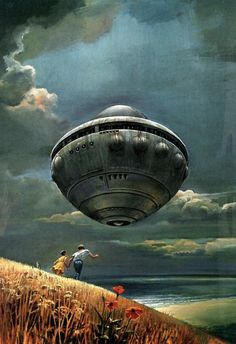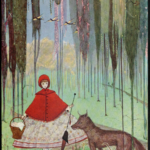Aliens, Elves, Angels
A few months ago, Scientific American published an article about Christianity vs. the existence of aliens entitled “Did Jesus  Save the Klingons?” It’s not a new idea. It’s not even an original title; a few years ago, The Times published an article called “Does Jesus Save Aliens?” People have been talking for years about the theological problem posed to Christianity by sentient, alien life.
Save the Klingons?” It’s not a new idea. It’s not even an original title; a few years ago, The Times published an article called “Does Jesus Save Aliens?” People have been talking for years about the theological problem posed to Christianity by sentient, alien life.
For myself, I don’t know why aliens should be a theological problem for Christians. I don’t know why they should be any kind of problem for anybody. If aliens do exist, we could be faced with problems much more urgent than a complex theological dilemma, particularly if the aliens arrived at Earth with death-rays and a will to conquer. And yet, you don’t see the Pentagon drawing up contingency plans for an alien invasion. There’s nothing more purposeless than deciding what to do about beings whose existence is entirely theoretical and whose nature, even if they do exist, is totally unknown.
As a matter of practical reality, there is no theological problem. Even as a matter of pure theory, I don’t see the conflict between Christianity and aliens. But what most interests me about the Christianity vs. aliens debate is not the reality, nor even the theory. It’s the sense that some of the people engaged in the debate actually think they’ve found a new question.
The whole business of aliens is a demonstration of Solomon’s maxim that there is nothing new under the sun. For thousands of years, humanity has been telling itself stories about races other than ourselves. We’ve had a thousand different names for them; fairy is only the best-known. Once people really believed they were next door – under the earth, in the wind, hiding in houses, living in the thick, ancient forests.
Eventually that belief died, or maybe it was only transmuted. Science, the long exploration to Earth’s farthest corners, and the unifying of the world convinced people we don’t share this planet, but what about the other planets? The idea of intelligent, alien life was pushed beyond our planet and now – commensurate with science’s increasing scope – it has been pushed beyond our solar system. Apparently, we can’t get over the idea.
Just as in Faerie we find the concept of rational, inhuman beings, so too we find the question of their souls and salvation. Folk tales do, on occasion, mix Christianity and Faerie (often with an explicit enmity between the two, but before too much is drawn from this, let it be remembered that the old tales also tend to assume hostility between Faerie and mankind). I’ve read stories that directly took on the question of whether Faeries could share Man’s salvation through Christ – and answered it both ways.
Did Jesus save the Elves? Did He save the Klingons? This makes a fascinating conversation, but it’s at least a thousand years old.
To enlighten the conversation, we should consider the one rational species aside from humanity, at whose fall and eternal destiny the Bible hints. Yes, I mean angels, who are generally discounted from these discussions, probably because angel is a religious term. Maybe if we called them by a sci-fi term, like fourth-dimensional beings …
Whatever the specifics of their nature, angels are rational, inhuman beings, and so Christianity has already come to grips with the notion of other races, and of whether Jesus will save them. And the answer, in this case, is no.
 No one knows why, as the Book of Hebrews states, it is not angels that He helps. No account of the angelic fall is provided, and angels, though a consistent presence in Scripture, are also a peripheral one. This much is clear: Some angels – the “holy angels” – are sinless; they don’t need to be redeemed. Others have sinned and fallen – these are called demons; they won’t be redeemed. And we can only wonder why.
No one knows why, as the Book of Hebrews states, it is not angels that He helps. No account of the angelic fall is provided, and angels, though a consistent presence in Scripture, are also a peripheral one. This much is clear: Some angels – the “holy angels” – are sinless; they don’t need to be redeemed. Others have sinned and fallen – these are called demons; they won’t be redeemed. And we can only wonder why.
“Did Jesus save aliens?” is not as earth-shattering a question as some writers seem to think. But maybe it’s a more complex one. Perhaps aliens, if they exist, never fell and don’t need to be saved. Perhaps, if they fell, they fell like humans, or perhaps they fell like angels. Maybe God can and will apply Jesus’ blood to their account, or maybe it’s not aliens that He helps. We cannot possibly know.
And this is why, even apart from the fact that aliens could well be nothing more than a figment of human imagination, that I don’t worry about the supposed theological quandary of alien life. Christianity is limber enough to handle the question.









































I love this post! This is a question I’ve had to grapple with, because my book deals with two alien worlds with their own races, and modern-day Earth is in the mix too (where, of course, Christ came!). Whether the villain race can be saved is unknown to my protagonists, but the other non-human race can be…they fell into sin in the beginning of their world, and God told them one day news of a Savior would come from another world. Christ’s blood covers them like it does humans.
I’ve always held that part of the reason His blood can cover us is because He shares our *humanity*, through His mother Mary, so it stretches my theological imagination a bit to suggest His blood could cover a non-human…but then it’s fiction! 😉
The chapter I quoted from Hebrews also called it “necessary” that Jesus share in our humanity … but then, we’d have to define humanity. I’ve read old sci-fi works that used “human” the way the genre now uses “sentient”.
Personally, I think it’s possible that fallen alien races, if they do exist, may be redeemed by the Cross. The question would be God’s to decide, and how do we know what He would or wouldn’t do?
Excellent post, and I fully agree. This is not a problem at all for Christian theology, let alone an insurmountable one — and your reminder of what the Bible tells us about angels makes that especially clear.
As many here would already know, C.S. Lewis did a fascinating take on the question of alien/non-human redemption in his SF novels Out of the Silent Planet and Perelandra. I think there’s a lot more room for creative speculation on this point, and as Lewis proved, it can certainly be done without compromising the essence of the Biblical message, or undermining the enormous importance of the cross.
Lewis wrote a little about aliens in Miracles, too, even touching the whole issue of Christianity’s supposedly “Man-centric” view of the universe. He said somewhere (I can’t remember where) that maybe the vast distances of space were God’s quarantine, to keep the infection of sin from spreading.
I do think “creative speculation”, as you call it, would be fun. You’d have to understand Christianity first, though. I say this because whoever wrote “Did Jesus Save the Klingons?” clearly doesn’t.
Terrific post. Makes me want to get C.S. Lewis out for another reread. Thank you!
Thanks! I know what you mean about C.S. Lewis; I thought about his science trilogy while working on this post.
Excellent approach to this question, Shannon. You’ve given us the Biblical view of the subject which is much better than mere speculation.
Becky
Thank you, Becky. 🙂
But what most interests me about the Christianity vs. aliens debate is not the reality, nor even the theory. It’s the sense that some of the people engaged in the debate actually think they’ve found a new question.
So basically you’re saying Vulcans can’t get saved?? Why that’s illogical!! Seriously!! I mean, what about Legolas? Surely Jesus died for him, right?? Ok, I’ll move on now.
My stories feature elves (and other fantasy creatures) who are basically humanity’s equals, but are affected by the choice of man and are considered fallen (similar to the Perelandrans). Therefore, they have the choice to follow Jesus (who they call the Ard Ri) just the same as humans. Problem: I have half-animal characters, (fauns, centaurs, mermaids) so that’s a bit of an issue. Any help here?